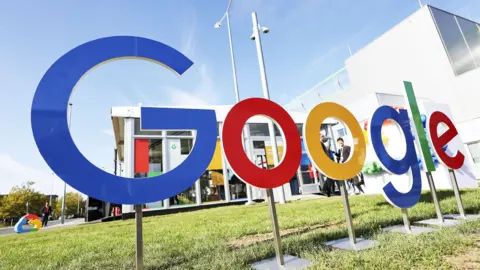[ad_1]
By Imran Rahman-Jones, Know-how reporter
 Getty Photographs
Getty PhotographsGoogle’s greenhouse gasoline emissions in 2023 had been 48% larger than in 2019, based on its newest environmental report.
The tech large places it right down to the growing quantities of vitality wanted by its knowledge centres, exacerbated by the explosive development of synthetic intelligence (AI).
AI-powered providers contain significantly extra pc energy – and so electrical energy – than commonplace on-line exercise, prompting a sequence of warnings concerning the expertise’s environmental affect.
Google’s goal is to achieve internet zero emissions by 2030 but it surely admits that “as we additional combine AI into our merchandise, lowering emissions could also be difficult.”
In its 2024 Environmental Report, Google says it’s “resulting from growing vitality calls for from the higher depth of AI compute.”
Knowledge centres are primarily large collections of pc servers – and AI wants an enormous quantity of them.
A generative AI system – similar to ChatGPT – may use round 33 instances extra vitality than machines working task-specific software program, based on a latest examine.
Nonetheless, Google’s report additionally reveals giant world disparities within the impacts of its knowledge centres.
A lot of the centres in Europe and the Americas get the vast majority of their vitality from carbon-free sources.
This compares with knowledge centres within the Center East, Asia and Australia, which use far much less carbon-free vitality.
Total, Google says about two thirds of its vitality is derived from carbon-free sources.
“In case you truly go into knowledge centre, it is actually sizzling and actually noisy,” says Tom Jackson, professor of data and data administration at Loughborough College.
“Individuals do not realise all the things they’re storing within the cloud is having an affect on their digital carbon footprint,” he says.
Prof Jackson runs the Digital Decarbonisation Design Group, which tries to measure and discover options to cut back the carbon footprint of knowledge utilization.
“Knowledge suppliers should work intently with giant organisations to assist them transfer away from storing a lot of their darkish knowledge,” he says.
Darkish knowledge is knowledge which has been collected by organisations however which has both been used as soon as or under no circumstances.
Nonetheless, storing it on chips nonetheless takes up giant quantities of vitality even when it’s not getting used.
“On common, 65% of the information an organisation shops is darkish knowledge,” says Prof Jackson.
He commends Google’s goal of reaching internet zero in its knowledge centres by 2030, however says it will likely be “actually powerful.”
The growing vitality – and water – use of AI has prompted a sequence of warnings, particularly because the sector is forecast to continue to grow quickly.
The boss of the UK’s Nationwide Grid mentioned in March that the mix of AI and quantum computing would result in a six-fold surge in demand within the subsequent 10 years.
Nonetheless, Microsoft co-founder Invoice Gates not too long ago downplayed the environmental affect of AI.
Talking in London final week, he recommended AI would improve electrical energy demand by between 2% and 6%.
“The query is, will AI speed up a greater than 6 per cent discount? And the reply is: actually,” he mentioned, as reported by the Monetary Occasions.
[ad_2]
2024-07-03 11:21:08
Source hyperlink:https://www.bbc.com/information/articles/c51yvz51k2xo


